



Imagine walking through fields of sunflowers, pausing to smell the Sorrento lemons swaying in the wind and reaching for the ripe guavas dangling from trees. All the while a sense of serenity hangs in the air even as peacocks strut around and birdsong fills the air. No, this isn’t a scene from Punjab or Haryana but at the quaint village of Manai in the arid desert of Jodhpur. Mharo Khet, an experiential farmland, has much such amazement, including a greenhouse packed with over 80 varieties of exotic fruits and vegetables.
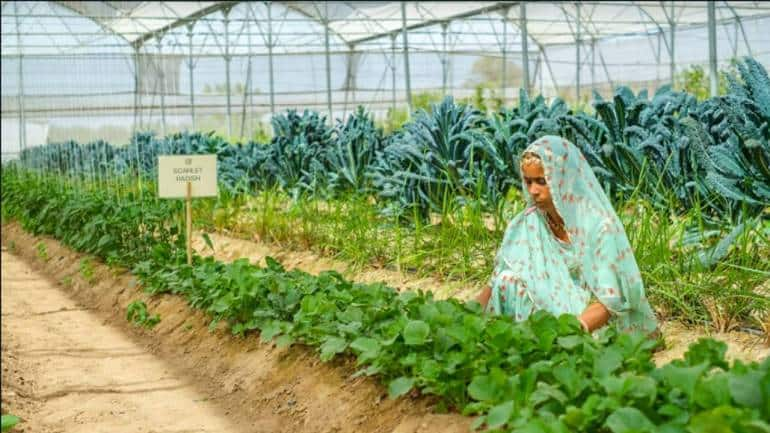 The farm at Mharo Khet is largely led by women workers.The birth of a Farm
The farm at Mharo Khet is largely led by women workers.The birth of a FarmThe idea of using their 30-year-old ancestral land to grow exotic vegetables came to biomolecular scientist Rajnush Agarwal and his psychologist wife Vedika on a vacation to Kyoto, Japan in 2019. “We were really impressed by the way the Japanese used farm fresh vegetables to carve simple yet gourmet meals. And it wasn’t just the small restaurants and hotels doing it but also Michelin-starred restaurants. Having the farm in the family and being attached to farming, we thought we could do it too,” says Rajnush. The 40-acre farm is largely used to cultivate medicinal plants used by the pharmaceutical industry.
The pandemic-enforced lockdown gave the couple time to dive headlong into the dream. The next few months were filled with interactions with experts from IIIM (Indian Institute of Integrative Medicine) in Jammu, who came down to train the team of farmers, as well as CAZRI (Central Arid Zone Research Institute) in Jodhpur, which carries out studies on desert plants. The couple slowly found their footing with broccoli — an exotic crop that they personally loved eating at home. Kohlrabi a vegetable generally grown in the colder regions of Uttarakhand and Himachal was next and then followed herbs such as rosemary, thyme, sage and oregano.
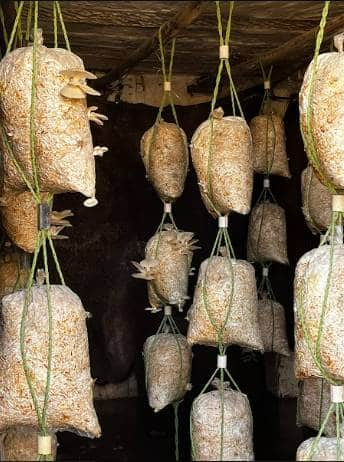 The temperature-controlled room for oyster mushrooms.
The temperature-controlled room for oyster mushrooms.Currently, the farm grows crops both native and exotic, ranging from fig, papayas, pomegranates and guavas to Brussels sprouts, moringa, strawberries, chamomile, kale, iceberg lettuce, jalapenos, oyster mushroom and more. Passion fruit and dragon fruit are next on the cards.
The biggest experiment was growing strawberries in the arid Rajasthan climate. “The technique of how this fruit is grown is very different from everything else. The fruits get destroyed within three-four days of touching the ground. And each strawberry plant while it’s growing and before it starts fruiting produces five more plants which are called sucker shoots. You need to deal with these long, skinny branches before they destroy the original plant. The first year of trying to grow strawberries was an utter failure. Of the 100 plants only seven survived and we got fruit from one. But that gave us all the knowledge we needed to improvise and survive,” says Rajnush. It took him three years of trials and failure to successfully harvest 1,000 kg of strawberries from 1,500 plants this year.
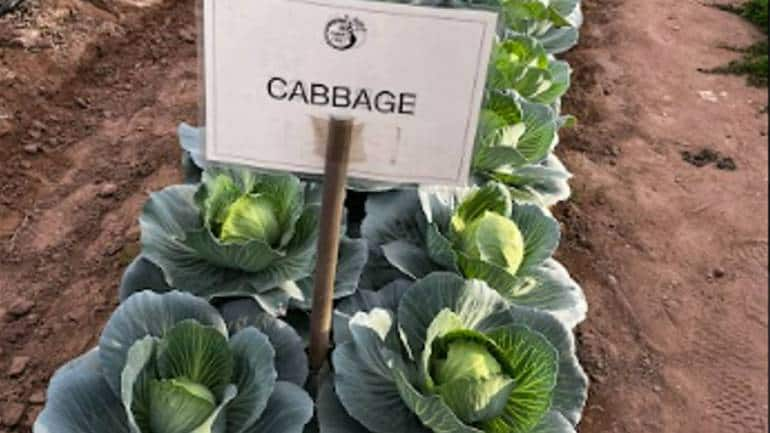 Cabbage growing at Mharo Khet, Jodhpur.
Cabbage growing at Mharo Khet, Jodhpur.To make commercial sense of their passion, they started selling the produce to vendors and homes within a radius of 15 km. “Similar to a BYOB (bring your own booze) concept in parties and get-togethers we have BYOT (build your own tokri). People can visit our website and choose the vegetables they want and the same is delivered to them in paper bags and cane tokris within four hours of harvest,” says Rajnush. Along with homes and restaurants, the produce of Mharo Khet is also a hit among pastry chefs, confectioneries and bakeries. F&B chain Subway sources lettuce from the farm while pizzerias and restaurants in the locality take the herbs. While water scarcity has been a constant challenge, Mharo Khet uses trickle-drip irrigation, to conserve water and rainwater harvesting to keep groundwater levels charged. Biopesticides and biofertilisers made with garlic, onion, clove, asafoetida, chilli, neem and fermented buttermilk have replaced chemicals in the field.
Apart from providing a green haven, farming has also taught a few life lessons to this Murakami fan. “The chalta hai attitude doesn’t work in farming. If you don’t know the practice you might be successful once but that might be a gamble. With all the volatility of climate and temperature, you really need to know the right practice for your region. Farming also teaches you to be patient and vigilant. By the time you realise that a disease has overtaken a plant, it’s probably too late. There are signs that you need to catch really early on,” says Rajnush.
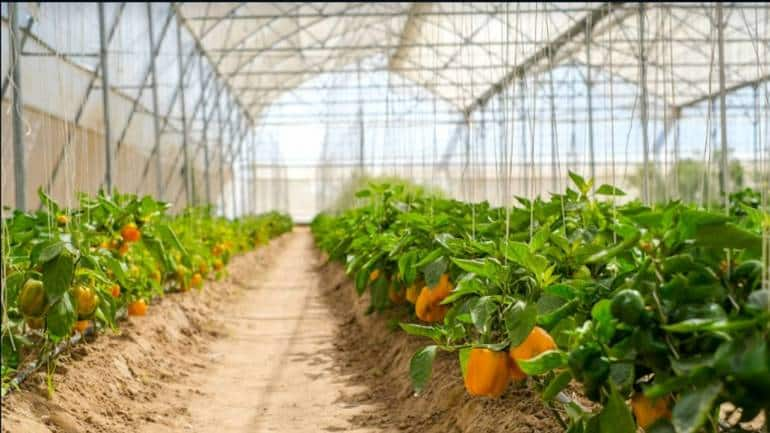 Yellow peppers growing in the green house at Mharo Khet.The farm experience
Yellow peppers growing in the green house at Mharo Khet.The farm experienceMany regulars who were buying vegetables wanted to visit the farm, and see how exotic crops could be cultivated in an otherwise barren region in western Rajasthan. This prompted the couple to open their farm to curious urbanites and also offer an immersive dining experience along with it.
The Mharo Khet experience commences with a farm visit where sustainable farming methods are explained and guests are encouraged to harvest some fruits and vegetables. “The intent is not to showcase our ecological credentials but to share with people how different fruits and vegetables are grown, and how fresh produce can be innovatively presented into delicious and nutritious plates. We want people to relax at the farm, be one with nature, and soak in the surroundings,” says Vedika.
The tour is followed by a seven-course, plant-forward meal led by the harvest of the day. Expect dishes such as fresh jalapenos stuffed with a fiery peanut chutney, soy-braised cabbage served on a large Swiss chard leaf and chaat-style matar kachori in creamy kadhi. Guavas from the field appear as desert aptly named "crumble from the top". The venue for the immersive dining experience is equally enchanting. Tables are set in a guava orchard with peacocks strutting around. Those looking for a more intimate setting can choose to dine in a chamomile field (January to March), among the sunflowers (October to March), or under a blossoming Rohida tree (March).
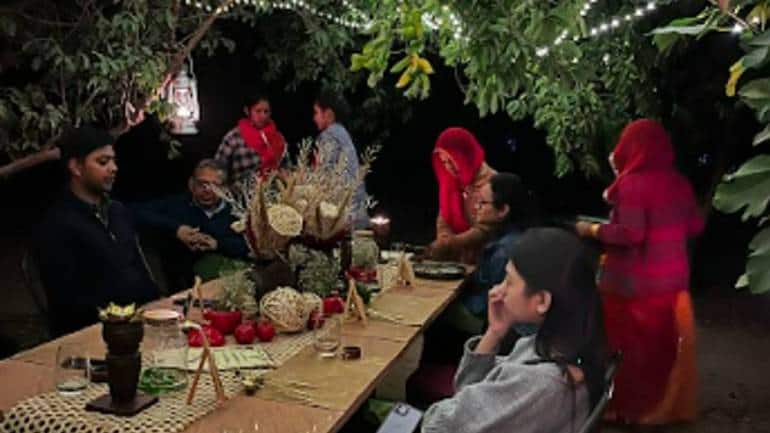 Farm women double up as servers for the dining experience in a guava orchard at Mharo Khet.
Farm women double up as servers for the dining experience in a guava orchard at Mharo Khet.Their attention to detail and eco-conscious practices is evident from the table setting, with dried flowers and twigs from the farm as well as heirloom items. The crockery is sourced locally from artisans from Jodhpur and Jaisalmer. Perhaps, the most enchanting aspect of Mharo Khet is the community integration. The farm is largely managed and led by women from the nearby villages. They tend to the fields in the day and turn servers by evening — with aplomb and their ghoonghat (veil) intact. “We trained them in basic etiquettes of serving and use of tableware. Since they wanted to retain their traditional wear we only added a bright sweater over the sari,” says Vedika, who’s also the brain behind the stylish table setting and stone plates used for serving.
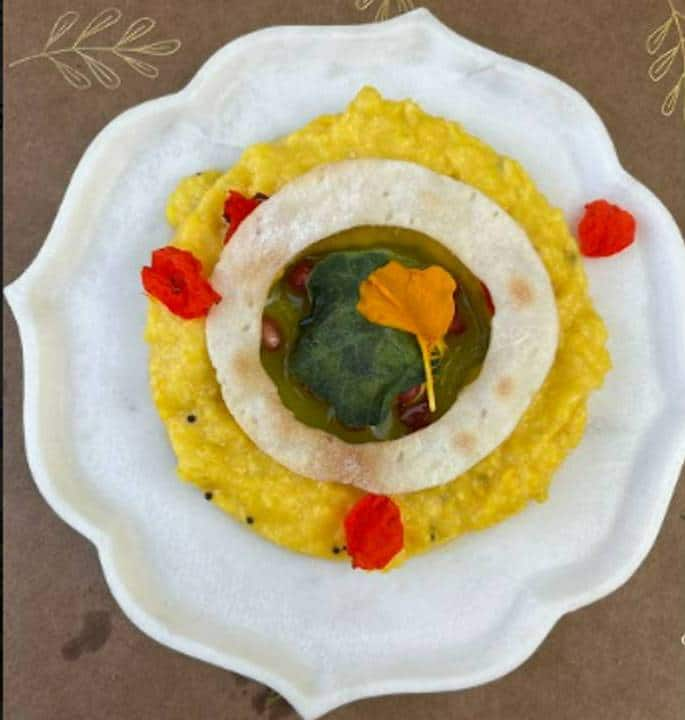 A grated corn dish at Mharo Kheto experiential dinner.
A grated corn dish at Mharo Kheto experiential dinner.Post the meal, guests can fly kites, lounge on charpais set under the shade of khejri trees or make use of the many swings. Posing for pictures in the tall sunflower fields is by far one of the most popular activities at Mharo Khet.
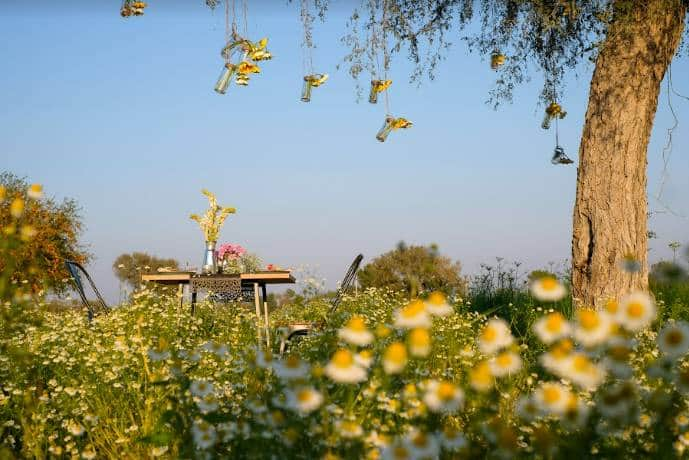 Mharo Khet, Jodhpur.Note: The dining experience at Mharo Khet is open to guests from October to March, which also happens to be peak season for the farm’s exotic produce. While the complete experience costs Rs 4,500, guests can opt for only the tour (Rs 2,000) or only the dining (Rs 3,500).
Mharo Khet, Jodhpur.Note: The dining experience at Mharo Khet is open to guests from October to March, which also happens to be peak season for the farm’s exotic produce. While the complete experience costs Rs 4,500, guests can opt for only the tour (Rs 2,000) or only the dining (Rs 3,500). Discover the latest Business News, Sensex, and Nifty updates. Obtain Personal Finance insights, tax queries, and expert opinions on Moneycontrol or download the Moneycontrol App to stay updated!
Find the best of Al News in one place, specially curated for you every weekend.
Stay on top of the latest tech trends and biggest startup news.